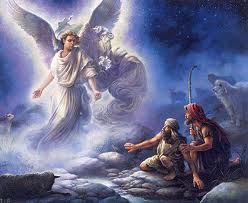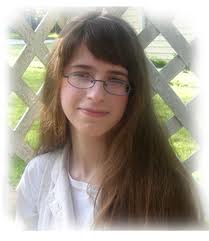The Echoes Of Christmas
Hark! Laughter like a lion wakes
To roar to the resounding plain.
And the whole heaven shouts and shakes,
For God Himself is born again,
And we are little children walking
Through the snow and rain.
– G. K. Chesterton, “The Wise Men”
I’m sure you all know the story by heart, but let me tell it again.
 Two thousand years ago, the Son of God was born in a stable, and His mother wrapped Him in a blanket and laid Him in a manger. An angel appeared to shepherds in the fields at night and told them a Savior had been born to them – Christ the Lord. Then a host of angels appeared with him, praising God and proclaiming peace on earth. And a star blazed over the Christ-child, guiding Wise Men from the east, who worshiped Him.
Two thousand years ago, the Son of God was born in a stable, and His mother wrapped Him in a blanket and laid Him in a manger. An angel appeared to shepherds in the fields at night and told them a Savior had been born to them – Christ the Lord. Then a host of angels appeared with him, praising God and proclaiming peace on earth. And a star blazed over the Christ-child, guiding Wise Men from the east, who worshiped Him.
That is the Christmas story, and God is the Author. I wonder how far its echoes can, and should, reach in all stories. What would a story look like, written in a spirit that, like Scrooge, honors Christmas and keeps it all the year?
The first thing I think of is that a story like that would always have hope. Not all stories do, and not all people think they ought to. The dark, the morbid, and the tragic are on the market and gaining more and more. Happily-ever-afters are not only rejected by many people; they are disdained. In a world that regards tragedy as the ultimate realism and darkness as distinctly rational, hope is cheap and happiness is inartistic.
And the truth that makes such pessimism strong is this: Tragedy is real, and as common as bread; even the Christmas story went on to Herod’s slaughter of the children. This world is dark. But Jesus came to be the light of the world. The light shines in the darkness, and the darkness has not overcome it.
Christmas means that for the worst person in the worst place on earth, there is hope, and hope is not glib. The star of Bethlehem is still shining, and a story written in its light will reflect it.
Another truth Christmas presses on the story-teller is the reality of joy, even for us. Once in Rhode Island they staged a production of Annie that ended with Annie waking up to find that it was all a dream; she was still in the cold orphanage she had never left. (There is a philosophy that it is better to light one candle than to curse the darkness, but there is another philosophy that it is better to snuff out that candle.)
The overflowing optimism of Annie – so shortly and fully squashed in Rhode Island – comes from a change in fortunes beyond all reason. It’s an incredible rags-to-riches story. But the most incredible rags-to-riches story of all is from lost sinner to child of God and co-heir with Christ. That is what Christ was born in Bethlehem to work.
 God sent “good news of great joy” to all the people. Or, as the master says in one of Christ’s parables, “Come and share your master’s happiness.” We talk a lot about God’s attributes – His holiness, His love, His creativity, His wisdom, His wrath. We would do well to remember more often His joy. Joy beats at the heart of things, and before despair and visions of almost Nietzschean bleakness, we have to say that, really, it’s not as bad as all that.
God sent “good news of great joy” to all the people. Or, as the master says in one of Christ’s parables, “Come and share your master’s happiness.” We talk a lot about God’s attributes – His holiness, His love, His creativity, His wisdom, His wrath. We would do well to remember more often His joy. Joy beats at the heart of things, and before despair and visions of almost Nietzschean bleakness, we have to say that, really, it’s not as bad as all that.
Christmas also reawakens the wonder of the universe. Our sense of wonder is easily lulled to sleep, though often it doesn’t take much to wake it up. A stray glance at the setting sun in the right moment can do it. Much, much more can Christmas.
No Christian who stops to consider Christmas can fail to see its wonder. I don’t say feel, because feelings can be elusive, especially when they’re summoned. But it’s so easy to see. God coming to the earth. The One who made everything, sleeping in a manger, an animal’s trough. The angels appearing to shepherds – a choir of angels, singing. Magi coming out of the east to worship Jesus – and to this day we don’t know who they were or how they knew to come, Gentiles and stargazers paying homage to the King of the Jews. In Chesterton’s words, God Himself was born again. The only wonder greater than that is the wonder of His love.
If a story were written under these three truths – joy, unfailing hope, and the wonder of things – it could take countless forms and faces. Mirrors are not the only things that reflect light. I will give one example, to show how far you can go from the facts of Christmas and still not lose its truth.
The Lord of the Rings so overflows with wonder I hardly need to say anything on it. From Sam’s awe at the Elves, to the enchantment of Lothlorien, to the majestic Pillars of the Kings – wherever you turn, you find it. Hope and joy are not as close to the surface, but there is a rich vein of both running through the story. In Minas Tirith, Pippin looked at Gandalf’s face and
he saw at first only lines of care and sorrow; though as he looked more intently he perceived that under all there was a great joy: a fountain of mirth enough to set a kingdom laughing, were it to gush forth.
Something very similar was said of Aragorn:
His face was sad and stern because of the doom that was laid on him, and yet hope dwelt ever in the depths of his heart, from which mirth would arise at times like a spring from the rock.
Even in the deep gloom of Mordor, hope burst through. There Sam
saw a white star twinkle for a while. The beauty of it smote his heart, as he looked up out of the forsaken land, and hope returned to him. For like a shaft, clear and cold, the thought pierced him that in the end the Shadow was only a small and passing thing: there was light and high beauty forever beyond its reach.
 So for the question of how far the echoes of Christmas can reach, the answer is – as far as any story to be told. Even in stories that wander to places where no one knows of Christmas, the revelation of Christmas – the reality of ultimate goodness – can still arch, like the sky, over everything.
So for the question of how far the echoes of Christmas can reach, the answer is – as far as any story to be told. Even in stories that wander to places where no one knows of Christmas, the revelation of Christmas – the reality of ultimate goodness – can still arch, like the sky, over everything.
The sun of righteousness has risen with healing in His wings, and we have no call to act even in our stories as if all is black. Stories are not woven without dark colors, but we should always be able to find that bright thread.
– – – – –
 Shannon McDermott is the author of The Last Heir, the novella Beauty of the Lilies, and the Christian Holmes series. She also works as an editor for SALT Magazine. To learn more about her or her work, go to her website at or join her on Facebook.
Shannon McDermott is the author of The Last Heir, the novella Beauty of the Lilies, and the Christian Holmes series. She also works as an editor for SALT Magazine. To learn more about her or her work, go to her website at or join her on Facebook.












































A play changed the ending of Annie like that? Man, what a dud! I used to enjoy sad endings. Then my life began to have lots of tragedy in it, and I learned to prefer happy endings.
My favorite quote about tragedy (and the attitude of hopelessness) is from Portal 2, after the evil computer builds up your hopes and then dashes them. “Just think about it–tragedy equals comedy plus time. So it’s actually pretty funny when you do the math.”
In Lord of the Rings, there’s a really interesting progression that nobody ever seems to talk about. It’s the pattern of growing darkness and corresponding growing light. The Old Forest is balanced by Bombadil, who is one-upped by the barrows, who is one-upped by Bombadil again, who is one-upped by the creepy stuff at the Prancing Pony, which is one-upped by Aragorn’s reveal, which is one-upped by Weathertop, which is one-upped by Rivendell, and on it goes. At the end, the immense darkness of the hopeless final battle is trumped by the destruction of the Ring and the rejoicing afterward.
I’ve seen a lot of books try to follow this, but I don’t think they’d really identified the pattern, so they didn’t get it exactly right.
(In a story one time, I had a villain who stayed behind the scenes like Sauron, and he wound up being the most TERRIFYING villain I’ve ever written. I know that keeping the villain hidden is frowned upon in modern books, but man, it works as a literary device. Nothing is more horrifying than the evil you can’t see.)
I hadn’t noticed the progression of good and evil in Lord of the Rings, but now that you mention it – yes, I can see it.
The fact that Sauron was unseen was one of the keys to his power as a character. Sauron was an impersonal, but relentless and all-pervading evil – a malignant force of nature. To show him in the narrative would have ruined that.
The production of Annie was about ten years ago; there’s more information here, if you’re interested. It didn’t last long. Martin Charnin, Annie‘s creator, heard about the new ending and attended a performance. After that, he met with the theater company’s executives and convinced them that Annie still in the orphanage was “not true to the spirit of the show”.
Beautiful thoughts, Shannon. Christmas drowns me in wonderment! Every. Single. Year. 🙂
Like you, I have no patience with books that have no sense of wonder, and only darkness. I’m the same way with movies, too. They have to be beautiful and invite amazement. Grit has some purpose in cinematography, but there has to be beauty to balance it out. I was just thinking about that last night while my husband and I watched “Thor”. That movie has a lot of beauty in it!
Thank you, Bethany. And we’re both on the same page: Grit isn’t wrong, but it shouldn’t be allowed to overwhelm everything else.
Great post, Shannon, especially with the prevailing winds in the Christian writing community pushing “realism.” The fact is, realism, if it’s God’s realism, is hopeful. Dark also, but not without hope. Joy, too, and wonder. Yes, those are excellent qualities to include in our fiction.
Becky
I’ve also noticed people urging “realism” – which always seems to mean something unpleasant: gore, tragedy, swearing, immoral sex. There are two ideas implicit in this. One, that more realistic art is better art – an interesting idea, though not one I have considered enough to debate. I wonder what such people think of Picasso?
The second, more serious idea is that being realistic means being dark. I don’t think this is really true; I also think some people discount too quickly the danger that dark art can sometimes make the world even darker than it already is.
[…] Shannon McDermott who is up for this month’s CSFF Award), wrote an inspiring post entitled “The Echoes of Christmas” in which she discusses what a story would look like if it were written as an expression of […]
That was one of my issues with Russell T. Davies’ Christmas specials for Doctor Who. With the exception of Christmas Invasion, they all end with the Doctor alone, depressed and wandering off again. I didn’t like it–it seemed antithetical to the meaning of Christmas.
It does sound antithetical. Even in secular Christmas stories, they tend to emphasize faith, hope, love, or simple good cheer.
Thanks for commenting, Galadriel.
Good day, i do believe i always saw a person been to my web site and so i stumbled on rewind the particular choose? . I’m just planning to in finding issues to boost my website! I guess it’s ample to apply a few of your mind!